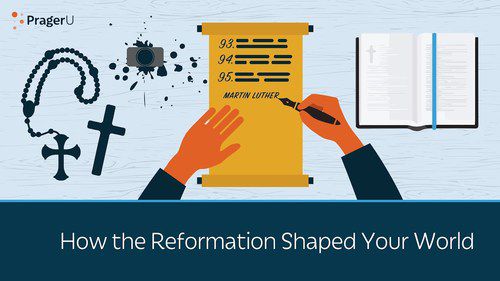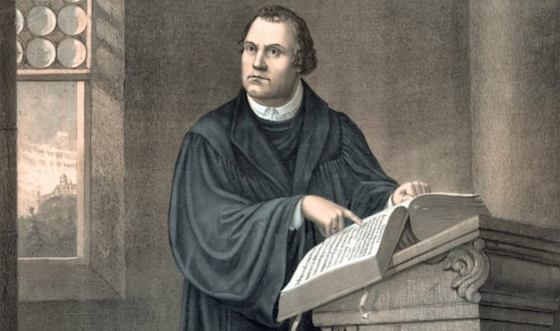
01/02/2019
Here’s a vital history lesson about the effect of Martin Luther’s revolt against the tyrannical Vatican in creating the modern world of individual rights and self-determination. The publication of Luther’s 95 Theses unleashed a pent-up desire for freedom from Rome that spiraled Europe into centuries of violent but positive change in the long run that included the Enlightenment and capitalism.
Below, Martin Luther translated the Vatican’s Latin Bible into German, so common people could read it.

Importantly for us, Luther’s reformation eventually led to the American Revolution, which King George denounced as “a Presbyterian war.”
STEPHEN CORNILS: Five hundred years ago, on October 31, 1517, a German Catholic monk by the name of Martin Luther posted some complaints he had about the Catholic Church on a church door in Wittenberg, Germany.
Luther was upset by the Church practice of selling what were known as “indulgences” to wealthy patrons. Indulgences might be loosely described as “get out of hell free” cards: pay this amount to the Church and the Church would make sure you don’t suffer unduly for your sins in the hereafter.
Luther felt very strongly that the practice not only made the Church look bad in the eyes of the common people, but had no scriptural basis. He believed the Church needed to reform itself or would lose its legitimacy.
Nobody, including Luther, thought that his complaints — and he had made a list of 95 of them — would amount to much. He simply wanted to spark a discussion on an issue that deeply concerned him. Instead, he set off a chain reaction that literally changed the course of history.
The name we give to this change is the Protestant Reformation.
Had Luther limited his criticism of the Church to indulgences as his friend, the Dutch scholar Erasmus, urged him to do, the matter might have been resolved and the old order preserved. But the headstrong Luther was not someone to be restrained.
Luther was what we could call today a flawed individual. He was brilliant and charismatic, but he was also vindictive and stubborn to a fault, and at the end of his life, sadly anti-Semitic.
Luther believed there should be no separation between the Bible and the believer. Every individual should have access to the word of God, Luther contended, as any priest did — or even the Pope. We take this view for granted now, but in the 16th century it was a radical concept.
And here’s why:
For more than a thousand years, the Church had been the dominant religious and political authority in Europe. It alone taught Christians how to understand the Bible. Luther was now challenging the very basis of this authority.
Not surprisingly, the Church didn’t take it well. What began as a squabble between a bold monk and the Catholic hierarchy soon developed into a titanic and bloody struggle that split Europe into opposing religious factions.
But the consequences of Luther’s ideas extended far beyond a religious dispute. It’s not an exaggeration to say that as a result of Luther’s ideas the modern individual was born — a free actor endowed with God-given rights that exist independent of government or any other institution. Each person could find those rights by reading and interpreting the Bible for himself.
Of course, to do that, you had to be able to read the Bible. And throughout the first millennium, right up until Luther’s day, only a very few people could.
Books, including the Bible, were all handwritten, a process usually that took months. This made books rare — and expensive. Furthermore, most Bibles were written in Latin, the language of the Church, a language familiar only to the clergy and educated elite. This exclusivity was one of the many ways in which the Church maintained its power.
Luther answered this problem by translating the Bible into everyday German so that anyone could read it.
But his efforts would all have been for naught except for the recent invention of the printing press by a fellow German, Johannes Gutenberg. The printing press allowed, for the first time in history, books — and soon thereafter, pamphlets and newspapers — to be widely distributed.
Without the printing press, Luther would have likely suffered the same grim fate of reformers before him like Jan Hus, who was tried, convicted of heresy and burned at the stake. But because of the printing press, Luther’s movement could not be stopped.
And, indeed, could not be controlled.
Bloody religious wars between Catholic and Protestant forces quickly followed on the heels of Luther’s new ideas. They lasted for two hundred years and cost countless lives. The Thirty Years’ War alone, from 1618 to 1648, is reputed to have led to about eight million deaths from fighting, famine, and disease.
But out of all this carnage, many positive changes came too. The Protestant empowerment of the individual led to capitalism and the Enlightenment, just to name two by-products of Luther’s protest. The American Revolution, with its idea that individuals “endowed by their Creator with certain unalienable Rights” should be free to form their own government, was another. Of the 56 signers of the Declaration of Independence, all but one was a Protestant.
Pronouncing a verdict on an epoch as significant as the Reformation is very difficult. Perhaps it’s best not even to try. But we can say this: no other single figure made more of an impact on the modern world than the German Monk, Martin Luther. And even he would be surprised to know that.
I’m Stephen Cornils, of the Wartburg Theological Seminary, for Prager University.
This is a content archive of VDARE.com, which Letitia James forced off of the Internet using lawfare.